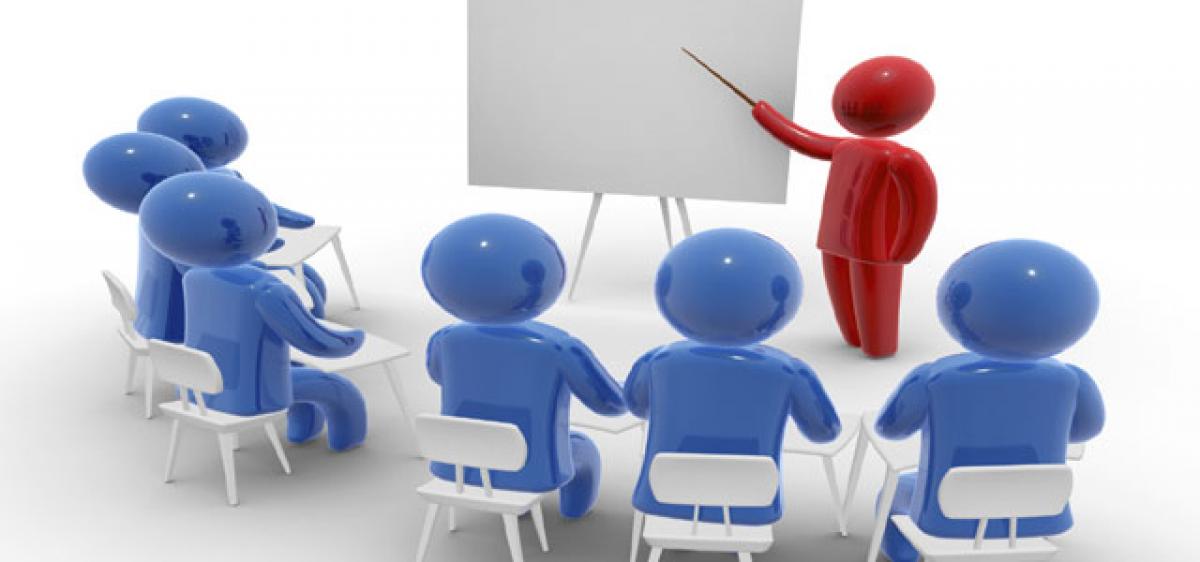Live
- Govt awaits Governor's nod to prosecute KTR
- CM exhibits ignorance with his statements on Guv: Kishan
- Amid buzz over arrest, KTR says he is ready to go to jail
- Govt trying to grab lands for a song: BJP MP
- BRS an obstacle for investments: Jagga Reddy
- TGPSC all set for holding Group-III exams
- Delays dog LRS cases as applications pile-up
- TGSPDCL deploys 101 ERT vehicles
- JIH to host national conclave in city
- OU celebrates National Library Week with book exhibition
Just In

The Department of Communication, Sarojini Naidu School of Arts and Communication, University of Hyderabad (UoH) with support from the U S Consulate General, Public Affairs Section, Hyderabad organised a two-day workshop titled “MEDIA ETHICS: Professional Preparation and Practice’ on Tuesday at Hyderabad.
Hyderabad: The Department of Communication, Sarojini Naidu School of Arts and Communication, University of Hyderabad (UoH) with support from the U S Consulate General, Public Affairs Section, Hyderabad organised a two-day workshop titled “MEDIA ETHICS: Professional Preparation and Practice’ on Tuesday at Hyderabad.
The two-day workshop was inaugurated by Katherine B Hadda Consul General, US Consulate General, Hyderabad. Prof Appa Rao Podile, Vice-Chancellor, University of Hyderabad was a special guest for the event. The keynote address was delivered by Prof Vinod Pavarala, UNESCO Chair on Community Media, Department of Communication, UoH.
The workshop is being organised as part of the Federal Assistance Grant awarded to Prof Kanchan K Malik, Head, Department of Communication, UoH for developing, in collaboration with Prof Shakuntala Rao from State University of New York, Plattsburgh, a professionally-oriented course on Media Ethics with the objective of strengthening sound ethical decision-making skills among media students and professionals.
In her inaugural address, Katherine B Hadda, Consul General, US Consulate, Hyderabad noted the shifting contours of media ethics in the wake of fake news, pressure to achieve advertising revenues, temptation to publish sensational stories and the shift of gatekeeping from humans to algorithms.
Despite all these drastic changes in the media ecosystem freedom of press is still the pillar of society in all democratic countries, while it is banned in totalitarian regimes.
Prof P Appa Rao, Vice-Chancellor, University of Hyderabad, special guest on the occasion observed how ethics are very hard to define as they are related to human behaviour and the need for objectivity and accuracy in the journalistic endeavour.
He stressed on the importance of professional training in journalism and the need for the inclusion of ethics education in the curriculum and congratulated the Department of Communication for taking this initiative and the US Consulate for supporting the initiative. He hoped that the workshop will give a direction to the debates on Media Ethics.
Prof Vinod Pavarala, UNESCO Chair on Community Media, Department of Communication, University of Hyderabad, in his Keynote address, while narrating a few anecdotes from his career, noted the various ethical dilemmas which a media professional encounters in the context of structural and institutional issues.
He observed, how journalism education should not just be about learning the nuts and bolts but should also address the soul, which could be done through introduction of real world cases in the media ethics curriculum and teaching them to students to develop critical thinking which could in turn help in developing a moral compass to guide young journalists.
Prof Kanchan K Malik, Head, Department of Communication, University of Hyderabad in her welcome address, stressed on how media professionals should develop a sophisticated and sensitive ‘ethics radar’ that they can use to spot and judiciously deal with ethical issues.
She noted that the thematic sessions of the workshop are aimed at developing a media ethics curriculum that will not only improve the class room vocabulary to talk on ethics, but will also augment the effectiveness of ethical thought process and decision making in the media.
Prof Shakuntala Rao, State University of New York, Plattsburgh while outlining the vision of the project, observed how these are best and the worst times for journalism, ethics and democracy.
She elaborated on the nature of the workshop which was not envisioned to alter people’s behaviour or decide best practices but to act as a sounding board, a place for journalists can come, share, learn, and inform about ethics.
The topics in the workshop have been kept contemporary and will also address certain philosophical underpinnings.
The thematic sessions of the workshop consist of discussions and reflections among experienced journalists and academics from Hyderabad on the contemporary ethical practices globally and in India.
Also Read:

© 2024 Hyderabad Media House Limited/The Hans India. All rights reserved. Powered by hocalwire.com







